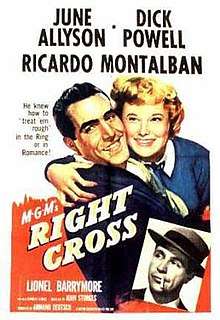Right Cross
Right Cross is a 1950 sports drama film released by MGM, directed by John Sturges, written by Charles Schnee and starring June Allyson, Ricardo Montalban, Dick Powell, Lionel Barrymore, and (in a small uncredited role) Marilyn Monroe.
| Right Cross | |
|---|---|
 Theatrical release poster | |
| Directed by | John Sturges |
| Produced by | Armand Deutsch |
| Written by | Charles Schnee |
| Starring | June Allyson Ricardo Montalban Dick Powell |
| Music by | David Raksin |
| Cinematography | Norbert Brodine |
| Edited by | James E. Newcom |
| Distributed by | MGM |
Release date |
|
Running time | 90 minutes |
| Language | English |
| Budget | $873,000[1][2] |
| Box office | $1,302,000[1] |
Plot
Sean O'Malley (Lionel Barrymore), a wheelchair-bound fight promoter who was once known as the best in his business, has lost his professional stature and is now suffering from poor health. Sean's daughter Pat (June Allyson) has taken over many of her father's responsibilities, and is romantically involved with Sean's best fighter, Johnny Monterez (Ricardo Montalban).
Though Sean had hoped that Johnny would help to revive his flagging career, he dislikes the fact that Johnny is ashamed of his Mexican heritage. When Sean tells Pat that promoter Allan Goff (Barry Kelley) is trying to steal Johnny from him, Pat decides to visit Johnny at his training camp. Pat arrives in time to watch Johnny fight a practice match, but the match ends abruptly when fighter Marty Lynn injures Johnny's hand.
While Johnny's hand is being examined at the hospital, Pat looks for her friend, Rick Gavery (Dick Powell), a hard-drinking sports reporter who has been following Johnny's career. Pat eventually finds Rick in jail, where she has found him on many previous occasions. When Johnny's physician, Dr. George Esmond, tells him that his hand is now vulnerable to permanent injury, Johnny asks the doctor to keep his condition a secret. After telling Pat and some reporters that his hand is merely bruised, Johnny returns to his training camp.
A short time later, Johnny receives word that his trouble-prone cousin, Luis, is in jail again and needs two hundred dollars for bail. The news reminds Johnny that Luis, who is also a Mexican immigrant, has not had the same opportunities that he has had to lift himself out of poverty. Believing that his hand injury may end his boxing career at any moment, Johnny decides to sign a lucrative contract with Goff, who has promised to provide him with a guaranteed income from promotional sales after his retirement.
Johnny takes Rick to visit his mother (Mimi Aguglia), but soon after they arrive, Johnny tells his sister Marina that she must stop dating her boyfriend, Bob, because he is a "gringo." Johnny also tells Marina that Bob is interested in her only because she is the sister of a famous fighter. When Rick accuses Johnny of harboring a prejudice against whites, Johnny sends him away with an insult.
Later, Pat, expecting a marriage proposal from Johnny, is disappointed when Johnny tells her that he has decided to sign with Goff. Sean dies a short time later, and Pat accuses Johnny of killing her father with his act of betrayal. Realizing that he has nearly lost Pat's love and Rick's friendship as a result of his actions, Johnny decides to get out of boxing forever by purposely losing the upcoming title match against Al Heldon. Though he loses the match, Johnny does not cause permanent injury to his hand until he punches Rick for being honest with him. With help from Rick, Pat and Johnny reconcile and look forward to a happy future together.
Cast
- June Allyson ... Pat O'Malley
- Dick Powell ... Rick Garvey
- Ricardo Montalban ... Johnny Monterez
- Lionel Barrymore ... Sean O'Malley
- Teresa Celli ... Marina Monterez
- Barry Kelley ... Allan Goff
- Tom Powers ... Tom Balford
- Mimi Aguglia ... Mom Monterez
- Marianne Stewart ... Audrey
- John Gallaudet ... Phil Tripp
- Wally Maher ... First Reporter
- Larry Keating ... Second Reporter
- Kenneth Tobey ... Ken, the Third Reporter
- Bert Davidson ... Fourth Reporter
- Marilyn Monroe ... Dusky Ledoux (uncredited)
- Robert Osterloh ... Totem, Heldon's Manager (uncredited)
Music
The dramatic score for the film was composed by David Raksin and was conducted by Raksin and Johnny Green. His music, exclusive of source music written by others, consisted only of music for the main and end titles, and one short piece in the first reel.[3]
Raksin's music was issued on cd in 2009, on Film Score Monthly records.
Reception
According to MGM records, the film's budget cost $873,000 and earned $955,000 in the US and Canada and $347,000 elsewhere, leading to a $64,000 loss for the studio.[1]
References
- The Eddie Mannix Ledger, Los Angeles: Margaret Herrick Library, Center for Motion Picture Study.
- Glenn Lovell, Escape Artist: The Life and Films of John Sturges, University of Wisconsin Press, 2008 p58
- Kaplan, Alexander (2009). David Raksin. "David Raksin at MGM (1950-1957)". Film Score Monthly (CD online notes). Los Angeles, California, U.S.A. 12 (2).
External links
- Right Cross on IMDb
- Right Cross at AllMovie
- Right Cross at the TCM Movie Database
- Right Cross at Rotten Tomatoes